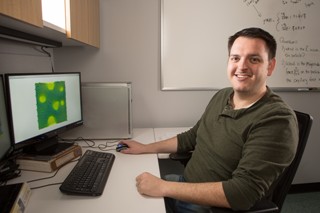Mar 18 2015
What if you could place your cell phone on a surface that would charge the battery in under a second? What if those same batteries could pack enough energy to power electric vehicles with the same range as gasoline- and diesel-powered vehicles? What if organic solar cells could compete with fossil fuel products?
 Joseph Carmack studies how to control nano-sized particles and use them to develop more sophisticated materials. Photo by Matt Reynolds
Joseph Carmack studies how to control nano-sized particles and use them to develop more sophisticated materials. Photo by Matt Reynolds
Joseph Carmack is working to determine the validity of all these possibilities and more because in his research "What if?" is the one question he never stops asking.
Carmack, a doctoral candidate in mechanical engineering, is studying how to control nano-sized particles and use them as building blocks to create more sophisticated materials that harness the advanced properties of nano-sized materials. He constructs computer models to run massive simulations of complex mesoscopic material systems to better understand and ultimately control their properties.
The distinguished doctoral fellow uses theoretical physics to simulate how nanoparticles self-organize in rubbers, plastics and other organic materials. The theoretical understanding he is developing with his research is pushing the development of the next generation of materials.
"All of today's challenges - global warming, the energy crisis, clean water - all have root in problems with materials," Carmack said. "The potential ramifications of the research I'm conducting could be outstanding because it's helping to realize possibilities [in innovation] faster than we ever have before."
Carmack's research is intense and requires he dedicate many hours in the lab. However, the father of two said spending time away from his research fuels his creativity.
"My family anchors me to reality," he said. "The things I experience when I spend time with them and take a break from my research enhance my ability to get around problems that I wouldn't solve after 10 hours in the lab."
In addition to his family, Carmack finds inspiration and support for his research from his advisor Paul Millett, assistant professor of engineering.
"He always makes me feel like my opinion is as valid as his," Carmack said. "He is not just a mentor about my research. His example has impacted me in many different positive ways. He's the reason I came to the University of Arkansas."
The Ashby, Mass. native is on track to complete his doctoral degree in May 2017. Post-graduation, Carmack plans to focus his career in innovative research that can be directly applied in industry.
"There is a gap between the theoretical nature of academic research and what goes on in industry, and there's a need for researchers that have the ability to fill that gap. I would like to make that area my career," he said.